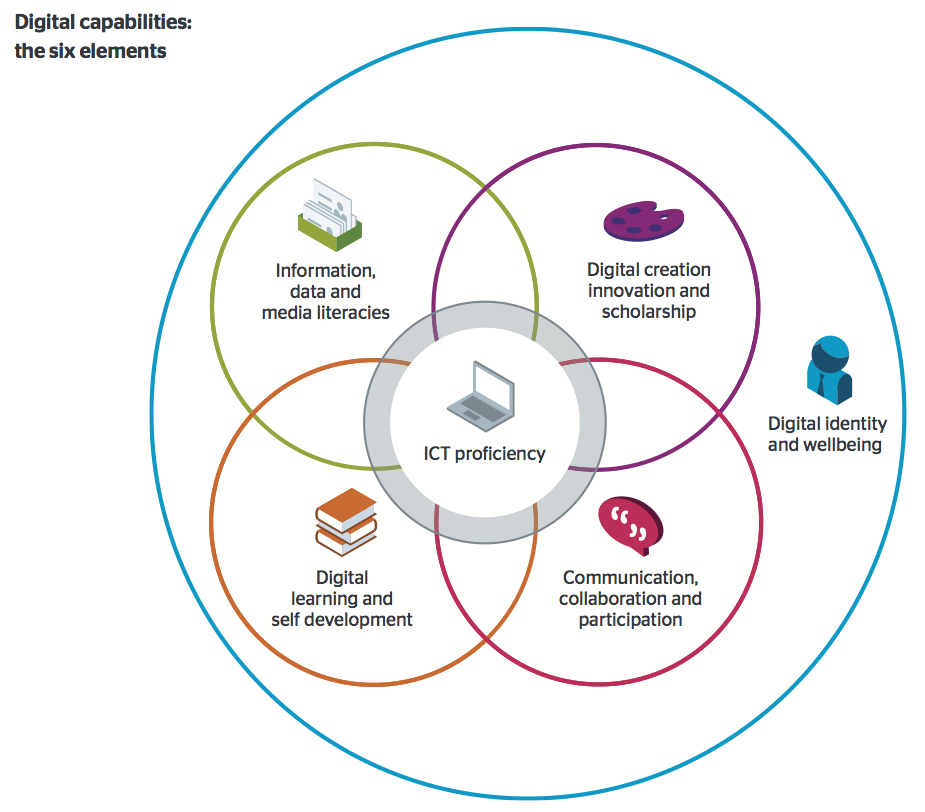Spotlight on Digital Capabilities V: Developing Leadership Digital Capabilities
Digital Capabilities can be defined as the skills and/or competencies required for living, learning and working in a digital society. The Jisc Digital Capability Framework provides a structure to help individuals understand what skills are needed and supports the development staff & students. Jisc have produced an initial model of the framework which describes digital capability as six overlapping elements (below).
“Effective use of digital technology by university and college staff is vital in providing a compelling student experience and in realising a good return on investment in digital technology.” (Jisc, 2015)
Framing Digital Capabilities
For a more comprehensive definition of each of these six core elements see our blog post Spotlight on Digital Capabilities I: What are Digital Capabilities?
In addition to the general definition provided above, Jisc have also created four example Digital Capability profiles for students, academics, researchers and leaders:
- Digital Capabilities: Student Profile
- Digital Capabilities: Academic Profile
- Digital Capabilities: Researcher Profile
The idea of ‘Digital Leadership’ can be separated into two parts – Being an Effective Digital Leader/Manager [PDF] (personal/professional development), and Leading/Managing an Effective Digital Organisation [PDF] or part of an organisation (organisational development):
[gview file=”http://blog.yorksj.ac.uk/moodle/files/2016/05/JISC-Digital-Leader-Lens.pdf”]
As Jisc have pointed out in their report ‘Deepening digital know-how: Building digital talent’, the nature of work is changing, leaders must recruit, retain, reward and recognise digital talent, we must recognise that digital wellbeing is a critical issue for individuals and organisations, and in order to do this we need digitally capable leadership and a strategic approach to digital capability.
Working in collaboration with ILS, and alongside Schools, Directorates and other stakeholders, we hope to identify what digital skills are required of our staff and students, provide advice and guidance on meeting these needs, and equip students and staff with the tools and resources they need to improve digital capability at a local or institutional level through on-going consultation and development.
Next steps…
- Ruth MacMullen and I, along with our Student Researchers Luke & Sue, will be writing up our findings from the recent Jisc Digital Student survey pilot, which we were involved in as part of a Students as Researchers project. The findings will hopefully allow us to respond to students changing expectations of the digital environment, and make further recommendations about developing digital capability.
- The Academic Development Directorate are also currently working with HR about how Digital Capability could be incorporated into the PDR process in the near future, alongside teaching & learning and research development.
- Jisc are also currently developing their ‘Discovery Tool’, as self-assessment tool which will help users identify their own digital capability development needs, this is due for release in the summer and we will be looking to how we could use this with staff to better inform the support we provide.
- Jisc are also producing additional ‘lenses’ or profiles for professional and support staff, which could act as benchmarks or starting points for further staff development discussions.
What do you think of the ‘leadership’ lens on the digital capability framework? Do you think it is important to develop digital leadership alongside students, staff and researchers? What do you think are the main opportunities or challenges? Let us know in the comments below…
For help, information or advice about Digital Capability, or to discuss any questions, comments or concerns you might have, please contact TEL@yorksj.ac.uk.
Phil
Reference
Jisc: Building Digital Capability https://www.jisc.ac.uk/rd/projects/building-digital-capability



